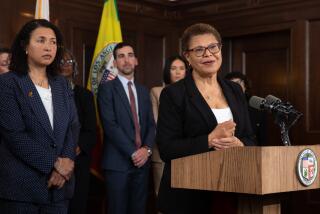Newton: L.A.’s pension peril
There are a couple of assumptions guiding much of the civic conversation about public employee pension reform: first, that organized labor would fight any reform tooth and nail; and second, that labor’s strong presence in Los Angeles would doom such measures to defeat.
I’m starting to doubt both of those assumptions, having talked at length to former Mayor Richard Riordan about some of his ideas for dramatically altering city pensions.
Riordan is gearing up to put a pension reform proposal before L.A. voters. Although he and others are still debating the details of such a measure, it could include provisions such as demanding increased contributions from city employees and freezing — or even reducing — salaries if the city’s share becomes unsupportable.
But before we get to the possibility of an election that pits Riordan against labor, there’s also a pension proposal from Mayor Antonio Villaraigosa. Unveiled last week, it has merits: It caps the maximum benefit that a retiree can earn, raises the retirement age at which a worker can receive a full pension and takes steps to eliminate pension “spiking,” a gambit by which some employees pile up overtime, deferred vacation and sick time to boost their final-year salaries and increase their pensions.
The problem with Villaraigosa’s solution? It doesn’t go nearly far enough. As Riordan put it to me last week, “It doesn’t even come close.”
For one thing, Villaraigosa’s proposal would involve only one of the city’s three pension plans. For another, it concentrates on new and future employees at a time when the city isn’t hiring much, so the reforms, even if enacted, wouldn’t do much to slow the growth of the problem, much less reverse it.
And how big is that problem? Right now, Los Angeles spends about $1.2 billion a year to fund its three pension plans. If those plans produce their projected investment return over the next five years, Los Angeles will be paying $2 billion a year in 2017. And that’s if the pension funds earn an annual rate of return of 7.75%, which is almost surely unrealistic, especially given that about a third of the systems’ investments are in fixed-income assets that are today paying historically low interest rates. To achieve an overall return of 7.75%, the pension funds would thus need returns of roughly 15% a year on the equities they buy. That’s preposterous.
And even if L.A. gets those extraordinary returns, within a few years the only services the city will be able to afford are police and fire. The rest of the budget will go to funding pension plans. If the funds don’t deliver high returns, even public safety services will have to be radically reduced.
Which brings me back to labor. Publicly, its response to Riordan’s warnings is predictable. The former mayor has been denounced as an interloper, lampooned for his wealth and reminded of his mixed history on this topic (as mayor, Riordan supported a ballot measure that increased pensions for police officers). The Service Employees International Union declared Riordan “an enemy of working people.”
That’s to be expected at this stage, but there is a fate that might be worse for labor than losing to Riordan: winning. Because if labor prevents Riordan from prevailing with a ballot measure to drastically reform pensions, the city could face insolvency in the next few years. And then it’s possible that a judge would curtail pension benefits even more sharply or demand greater sacrifices of current employees than Riordan is proposing.
Recognizing that threat, labor leaders may reason that it’s better to let Riordan take heat from union members than for those same leaders to participate in pension cuts or contribution increases that make them complicit. They might nominally object but in fact wage only a half-hearted campaign against Riordan’s measure, understanding that it might ultimately save them from themselves.
“If labor leaders do not see their positions at risk,” noted Alex Rubalcava, a municipal finance expert who works closely with Riordan, “they’re not paying attention.”
Then there’s the question of how labor would fare if it targeted the reform measure for defeat. Public anger over perceived largesse in public employee pensions is a serious phenomenon, and recent ballot measures to curtail those pensions won in San Diego, a fairly conservative city, and San Jose, a very liberal one. It’s quite possible that even if labor did oppose a similar measure here, it would nevertheless pass.
Riordan, as usual, is playing his cards carefully. He was coy about his proposal when I met with him at his Brentwood home (in the library, dominated by a photograph of Riordan and then-Texas Gov. George W. Bush), but he insisted this was the most important civic effort on his plate. And he emphasized that L.A. is careening toward bankruptcy.
Today’s pension system, he said, is “a pyramid scheme.” Riordan, who made a fortune as an investor, also made it clear that he’s already covering his bases: “I sold all my government bonds two years ago.”
Jim Newton’s column appears Mondays. His latest book is “Eisenhower: The White House Years.” Reach him at jim.newton@latimes.com or follow him on Twitter: @newton_jim.
More to Read
A cure for the common opinion
Get thought-provoking perspectives with our weekly newsletter.
You may occasionally receive promotional content from the Los Angeles Times.







